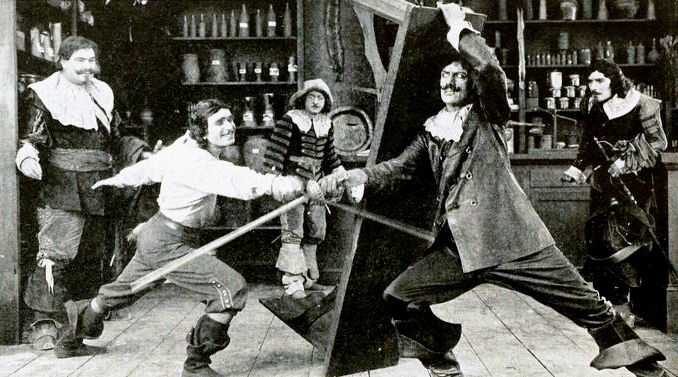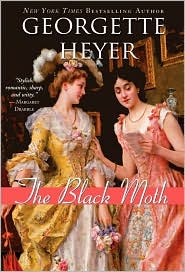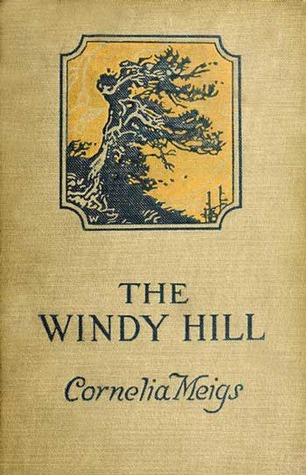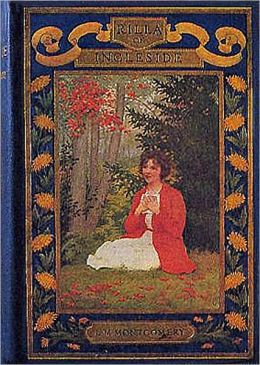new posts in all blogs
Viewing: Blog Posts Tagged with: 1921, Most Recent at Top [Help]
Results 1 - 6 of 6
How to use this Page
You are viewing the most recent posts tagged with the words: 1921 in the JacketFlap blog reader. What is a tag? Think of a tag as a keyword or category label. Tags can both help you find posts on JacketFlap.com as well as provide an easy way for you to "remember" and classify posts for later recall. Try adding a tag yourself by clicking "Add a tag" below a post's header. Scroll down through the list of Recent Posts in the left column and click on a post title that sounds interesting. You can view all posts from a specific blog by clicking the Blog name in the right column, or you can click a 'More Posts from this Blog' link in any individual post.

By:
Becky Laney,
on 12/9/2016
Blog:
Becky's Book Reviews
(
Login to Add to MyJacketFlap)
JacketFlap tags:
Anne books,
1921,
book I bought,
books reviewed in 2016,
books reread in 2016,
adult classics,
war,
World War I,
L.M. Montgomery,
Add a tag
Rilla of Ingleside. L.M. Montgomery. 1921. 277 pages. [Source: Bought]
First sentence: It was a warm, golden-cloudy, lovable afternoon. In the big living-room at Ingleside Susan Baker sat down with a certain grim satisfaction hovering about her like an aura; it was four o’clock and Susan, who had been working incessantly since six that morning, felt that she had fairly earned an hour of repose and gossip.
Premise/plot: Rilla of Ingleside chronicles "the great war" from the perspective of Rilla Blythe, Anne and Gilbert's youngest child. When the war begins, she's fourteen or so. But she grows up fast, in part because of the war, because of the changes the war brings, how it effects her family and community. And also in part because she takes on more responsibility. She not only does junior red cross work, I believe, but she fosters a 'war baby.' She takes on essentially a newborn baby 'orphaned' by the war. The mother has died. The father is a soldier--who knows where, who may or may not come back. She is to have 'the raising' of the baby to herself. Rilla is especially fond of Walter, her favorite brother, and Ken, the man she hopes to marry one day. The novel provides a behind the scenes glimpse of what daily life was like during the war, during that time period.
My thoughts: LOVE, LOVE, LOVE this one. It's such a solid and strong--and incredibly emotional--finish to a great series.
All cats are mysterious but Dr. Jekyll-and-Mr. Hyde—”Doc” for short — was trebly so. He was a cat of double personality — or else, as Susan vowed, he was possessed by the devil. To begin with, there had been something uncanny about the very dawn of his existence.
“The only thing I envy a cat is its purr,” remarked Dr. Blythe once, listening to Doc’s resonant melody. “It is the most contented sound in the world.”
Dog Monday was the Ingleside dog, so called because he had come into the family on a Monday when Walter had been reading Robinson Crusoe. He really belonged to Jem but was much attached to Walter also. He was lying beside Walter now with nose snuggled against his arm, thumping his tail rapturously whenever Walter gave him an absent pat. Monday was not a collie or a setter or a hound or a Newfoundland. He was just, as Jem said, “plain dog” — very plain dog, uncharitable people added. Certainly, Monday’s looks were not his strong point.
“There’s no use thinking about what you’re going to do — you are tolerably sure not to do it.”
The new day is knocking at the window. What will it bring us, I wonder.
“What does it matter if there’s going to be a war over there in Europe? I’m sure it doesn’t concern us.” Walter looked at her and had one of his odd visitations of prophecy. “Before this war is over,” he said — or something said through his lips—”every man and woman and child in Canada will feel it — you, Mary, will feel it — feel it to your heart’s core. You will weep tears of blood over it. The Piper has come — and he will pipe until every corner of the world has heard his awful and irresistible music. It will be years before the dance of death is over — years, Mary. And in those years millions of hearts will break.”
“Susan, I keep thinking today of once when he cried for me in the night. He was just a few months old. Gilbert didn’t want me to go to him — he said the child was well and warm and that it would be fostering bad habits in him. But I went — and took him up — I can feel that tight clinging of his little arms round my neck yet. Susan, if I hadn’t gone that night, twenty-one years ago, and taken my baby up when he cried for me I couldn’t face tomorrow morning.”
Nobody missed Dog Monday at first. When they did Shirley went back for him. He found Dog Monday curled up in one of the shipping-sheds near the station and tried to coax him home. Dog Monday would not move. He wagged his tail to show he had no hard feelings but no blandishments availed to budge him. “Guess Monday has made up his mind to wait there till Jem comes back,” said Shirley, trying to laugh as he rejoined the rest.
A baby by day was dreadful enough; a baby by night was unthinkable.
Even the most thoughtful and watchful of parents do not see everything that goes on under their very noses.
I wonder if those of us who have lived half our lives in the old world will ever feel wholly at home in the new.
No matter how much we value what our lessons have brought us we don’t want to go on with the bitter schooling.
“I wonder,” said Miss Oliver, “if humanity will be any happier because of aeroplanes. It seems to me that the sum of human happiness remains much the same from age to age, no matter how it may vary in distribution, and that all the ‘many inventions’ neither lessen nor increase it.”
The job isn’t finished — it isn’t really begun. The old world is destroyed and we must build up the new one. It will be the task of years.
“Is it Rilla-my-Rilla?” he asked, meaningly. Emotion shook Rilla from head to foot. Joy — happiness — sorrow — fear — every passion that had wrung her heart in those four long years seemed to surge up in her soul for a moment as the deeps of being were stirred. She had tried to speak; at first voice would not come. Then—”Yeth,” said Rilla.
© 2016 Becky Laney of
Becky's Book Reviews
The Windy Hill. Cornelia Meigs. 1921. 210 pages. [Source: Bought]
The Windy Hill by Cornelia Meigs is a 1922 Newbery Honor book. She received two more Newbery Honors for Clearing Weather and
Swift Rivers. Her Invincible Louisa won the Newbery in 1934. (I plan on reading Invincible Louisa in February.)
Oliver and Janet are staying with their cousin Jasper. In the past, they've loved spending time with him. He's a real favorite. But. This visit there is something a bit off. Jasper isn't acting like himself at all. They're worried about him, and rightly so it turns out.
The book opens with Oliver escaping or running away. Jasper has arranged for them both (Oliver and Janet) to meet someone--a cousin their own age, a girl. It's the last bit that decides it for Oliver. So off he goes in bit of a mood. But he meets someone very interesting. Two people actually. A man he calls Beeman, and a girl around his own age. And the 'Beeman' is quite a storyteller. They become friends, and, he brings Janet to meet them both. They eventually confide in him their worries about Jasper...
Did I enjoy The Windy Hill? For the most part, yes. I liked the Beeman's stories best of all. These stories are adventure-packed. They also turn out to be true family stories. The book itself has some excitement--or action. The characters do more than sit around listening to stories. It concerns a flood. So plenty of drama is to be had.
Windy Hill was a quick read. It was enjoyable enough. Perhaps not a 'must' read, but nice all the same.
© 2015 Becky Laney of
Becky's Book Reviews

By: Sarah Hansen,
on 6/22/2014
Blog:
OUPblog
(
Login to Add to MyJacketFlap)
JacketFlap tags:
Oxford World's Classics,
1921,
*Featured,
Alexandre Dumas,
The Three Musketeers,
musketeers,
Quizzes & Polls,
The Man in the Iron Mask,
pallette,
bary,
belcher,
siegmann,
fairbanks,
niblo,
Literature,
Add a tag

The Three Musketeers, by Alexandre Dumas, celebrates its 170th birthday this year. The classic story of friendship and adventure has been read and enjoyed by many generations all over the world, and there have been dozens of adaptations, including the classic silent 1921 film, directed by Fred Niblo, and the recent BBC series. Take our quiz to find out how much you know about the book, its author, and the time at which it was written.

Still from the American film The Three Musketeers (1921) with George Siegmann, Douglas Fairbanks, Eugene Pallette, Charles Belcher, and Léon Bary. Public Domain via Wikimedia Commons.
Your Score:
Your Ranking:
For over 100 years Oxford World’s Classics has made available the broadest spectrum of literature from around the globe. Each affordable volume reflects Oxford’s commitment to scholarship, providing the most accurate text plus a wealth of other valuable features, including expert introductions by leading authorities, voluminous notes to clarify the text, up-to-date bibliographies for further study, and much more. You can follow Oxford World’s Classics on Twitter and Facebook. Read previous interviews with Word for Word Book Club guest speakers.
Subscribe to the OUPblog via email or RSS.
Subscribe to only literature articles on the OUPblog via email or RSS.
The post How much do you know about The Three Musketeers ? appeared first on OUPblog.


By:
Becky Laney,
on 4/14/2013
Blog:
Becky's Book Reviews
(
Login to Add to MyJacketFlap)
JacketFlap tags:
favorite books,
classics,
coming of age,
World War I,
L.M. Montgomery,
favorite authors,
children's classic,
1921,
books reviewed in 2013,
2013 Sunday Salons,
Add a tag
Rilla of Ingleside. L.M. Montgomery. 1921. 280 pages.
IT was a warm, golden-cloudy, lovable afternoon. In the big living-room at Ingleside Susan Baker sat down with a certain grim satisfaction hovering about her like an aura; it was four o'clock and Susan, who had been working incessantly since six that morning, felt that she had fairly earned an hour of repose and gossip. I LOVE, LOVE, LOVE Rilla of Ingleside. It is beautiful, heartbreaking, wonderful, memorable, and compelling. It is
everything it should be. It closely follows World War I--from the Canadian home front; and at times it shows just how ugly and frightening war can be. It's a patriotic novel, however. Rilla of Ingleside is also an unforgettable coming of age story. Readers watch Rilla mature from a laughter-loving fourteen year old girl into a strong, resilient young woman ready for life and love. This is Rilla's story from cover to cover. Rilla is forced to say goodbye to three brothers (Jem, Walter, Shirley), two childhood friends (Jerry, Carl), and her young love (Kenneth Ford) as they go off to war and uncertain futures. And she has to do with a smile on her face and no tears. Will she ever see any of them again? Will they return whole? Will life ever be the same for any of them again?
But Rilla is ever-busy. Not only is she doing work for the Red-Cross, she's adopted a war orphan! Though she's just fourteen, this young baby boy will be HER responsibility. For Rilla who has never really "liked" babies or found them cute and adorable, this is a challenge...at least at first. But as he starts to grow and change...her heart melts.
My favorite characters were Rilla, Susan Baker, Walter, Miss Oliver, and Dog Monday. If you've read this one, don't you agree that the Dog Monday parts are incredibly moving?
From chapter one:
There was a big, black headline on the front page of the Enterprise, stating that some Archduke Ferdinand or other had been assassinated at a place bearing the weird name of Sarajevo, but Susan tarried not over uninteresting, immaterial stuff like that; she was in quest of something really vital.
Well, that is all the notes and there is not much else in the paper of any importance. I never take much interest in foreign parts. Who is this Archduke man who has been murdered?" "What does it matter to us?" asked Miss Cornelia, unaware of the hideous answer to her question which destiny was even then preparing. "Somebody is always murdering or being murdered in those Balkan States. It's their normal condition and I don't really think that our papers ought to print such shocking things.
Wherever Rilla Blythe was, there was laughter.
There was another occupant of the living-room, curled up on a couch, who must not be overlooked, since he was a creature of marked individuality, and, moreover, had the distinction of being the only living thing whom Susan really hated. All cats are mysterious but Dr. Jekyll-and-Mr. Hyde–"Doc" for short–were trebly so. He was a cat of double personality–or else, as Susan vowed, he was possessed by the devil. To begin with, there had been something uncanny about the very dawn of his existence. Four years previously Rilla Blythe had had a treasured darling of a kitten, white as snow, with a saucy black tip to its tail, which she called Jack Frost. Susan disliked Jack Frost, though she could not or would not give any valid reason therefor.
"Take my word for it, Mrs. Dr. dear," she was wont to say ominously, "that cat will come to no good."
"But why do you think so?" Mrs. Blythe would ask.
"I do not think–I know," was all the answer Susan would vouchsafe.
"The only thing I envy a cat is its purr," remarked Dr. Blythe once, listening to Doc's resonant melody. "It is the most contented sound in the world."
Rilla is the only one of my flock who isn't ambitious. I really wish she had a little more ambition. She has no serious ideals at all–her sole aspiration seems to be to have a good time.
From chapter two,
Rilla was the "baby" of the Blythe family and was in a chronic state of secret indignation because nobody believed she was grown up. She was so nearly fifteen that she called herself that, and she was quite as tall as Di and Nan; also, she was nearly as pretty as Susan believed her to be. She had great, dreamy, hazel eyes, a milky skin dappled with little golden freckles, and delicately arched eyebrows, giving her a demure, questioning look which made people, especially lads in their teens, want to answer it. Her hair was ripely, ruddily brown and a little dent in her upper lip looked as if some good fairy had pressed it in with her finger at Rilla's christening. Rilla, whose best friends could not deny her share of vanity, thought her face would do very well, but worried over her figure, and wished her mother could be prevailed upon to let her wear longer dresses. She, who had been so plump and roly-poly in the old Rainbow Valley days, was incredibly slim now, in the arms-and-legs period. Jem and Shirley harrowed her soul by calling her "Spider." Yet she somehow escaped awkwardness. There was something in her movements that made you think she never walked but always danced. She had been much petted and was a wee bit spoiled, but still the general opinion was that Rilla Blythe was a very sweet girl, even if she were not so clever as Nan and Di.
Rilla loved Walter with all her heart. He never teased her as Jem and Shirley did. He never called her "Spider." His pet name for her was "Rilla-my-Rilla"�a little pun on her real name, Marilla...
Dog Monday was the Ingleside dog, so called because he had come into the family on a Monday when Walter had been reading Robinson Crusoe. He really belonged to Jem but was much attached to Walter also. He was lying beside Walter now with nose snuggled against his arm, thumping his tail rapturously whenever Walter gave him a pat. Monday was not a collie or a setter or a hound or a Newfoundland. He was just, as Jem said, "plain dog"�very plain dog, uncharitable people added. Certainly, Monday's looks were not his strong point. Black spots were scattered at random over his yellow carcass, one of them blotting out an eye. His ears were in tatters, for Monday was never successful in affairs of honour. But he possessed one talisman. He knew that not all dogs could be handsome or eloquent or victorious, but that every dog could love. Inside his homely hide beat the most affectionate, loyal, faithful heart of any dog since dogs were; and something looked out of his brown eyes that was nearer akin to a soul than any theologian would allow. Everybody at Ingleside was fond of him, even Susan.
"There's plenty of time for you to be grown up, Rilla. Don't wish your youth away. It goes too quickly. You'll begin to taste life soon enough."
"Taste life! I want to eat it," cried Rilla, laughing. "I want everything–everything a girl can have. I'll be fifteen in another month, and then nobody can say I'm a child any longer. I heard someone say once that the years from fifteen to nineteen are the best years in a girl's life. I'm going to make them perfectly splendid–just fill them with fun."
"There's no use thinking about what you're going to do–you are tolerably sure not to do it."
"Oh, but you do get a lot of fun out of the thinking," cried Rilla.
"You think of nothing but fun, you monkey," said Miss Oliver indulgently, reflecting that Rilla's chin was really the last word in chins. "Well, what else is fifteen for?"
From chapter three,
"The new day is knocking at the window. What will it bring us, I wonder.... "I think the nicest thing about days is their unexpectedness," went on Rilla. "It's jolly to wake up like this on a golden-fine morning and day-dream for ten minutes before I get up, imagining the heaps of splendid things that may happen before night."
© 2013 Becky Laney of
Becky's Book Reviews

By:
Becky Laney,
on 2/7/2012
Blog:
Becky's Book Reviews
(
Login to Add to MyJacketFlap)
JacketFlap tags:
classics,
adult fiction,
1924,
Adult Science Fiction,
1921,
book I bought,
1972,
Books Reviewed in 2012,
science fiction,
Add a tag
We. Yevgeny Zamyatin. Translated by Mirra Ginsburg. 1921/1972*. HarperCollins. 233 pages.
I shall simply copy, word for word, the proclamation that appeared today in the One State Gazette... We is a dystopian novel. I've been wanting to read it for almost as long as I've been blogging.
What did I think of We?
I found the novel interesting but not necessarily comprehensible. I struggled to make sense of this one. (I think I followed about a third of it.) I'm sure I missed much of what was going on simply because I was trying to make sense of this world, this society. Could the problem--for me--be this society's emphasis on math and logic?
The narrator of We is a state mathematician named D-503. (I did figure out that men have a consonant and an odd number; women have a vowel and an even number). Everything is calculated and precise and governed or regulated. Even intimate relationships. D-503 has two registered partners--O-90 and I330. O-90 desperately wants a child, a dream that isn't likely to come true. And I330 is a big, big tease who manipulates men in oh-so-many ways. Perhaps because D-503 cannot understand her at all, cannot predict anything about her, she fascinates him, enslaves him.
So one of D-503's projects is working on the spaceship, Integral. One State has plans to conquer the universe. Perhaps because of what he does, I-330 sees an opportunity to use him to get what she wants...
A human being is like a novel: until the last page you don't know how it will end. Or it wouldn't be worth reading... (162)
Read We
- If you are looking for a literary quality to your science fiction
- If you enjoy a challenge as you read; if you enjoy complexity
- If you are looking to read a science fiction classic
- If you are interested in Russian literature from this time period
*It was first translated into English (according to Wikipedia) in 1924, this translation by Mirra Ginsburg was done in 1972.
© 2012 Becky Laney of
Becky's Book Reviews

The Black Moth. Georgette Heyer. 1921/2009. Sourcebooks. 355 pages.
Prologue: Clad in his customary black and silver, with raven hair unpowdered and elaborately dressed, diamonds on his fingers and in his cravet, Hugh Tracy Clare Belmanoir, Duke of Andover, sat at the escritoire in the library of his town house, writing.
Chapter one: Chadber was the name of the host, florid of countenance, portly of person, and of manner pompous and urbane.
Loved this one. I had my doubts--I'm not sure why--but I ended up just loving it. Why did I have doubts? Well, for some reason I thought that since this was Georgette Heyer's first novel it would perhaps be clumsy or awkward. Not quite as good as the others that I've come to love. Is it her best work? Probably not. But it's good. It's fun. It's fun in a dashing kind of way.
 The characters. So many to love, so many to love to hate. Jack Carstares, Earl of Wyndam, our proper hero. Richard, his younger brother with a secret. Lavinia, Richard's wife, the woman I ended up loving to hate! Tracy, Lavinia's "devil" of a brother who thinks kidnapping is the way to get your heart's desire. Diane, the lovely woman adored by two men--one a highwayman, one a kidnapper. Miles, a good friend who has always believed in his friend no matter what. And so many more!
The characters. So many to love, so many to love to hate. Jack Carstares, Earl of Wyndam, our proper hero. Richard, his younger brother with a secret. Lavinia, Richard's wife, the woman I ended up loving to hate! Tracy, Lavinia's "devil" of a brother who thinks kidnapping is the way to get your heart's desire. Diane, the lovely woman adored by two men--one a highwayman, one a kidnapper. Miles, a good friend who has always believed in his friend no matter what. And so many more!
The writing. So much to love. It's detailed, but not in a heavy way. More in a witty kind of way. Take this description of Lavinia, "She was ever thus -- not two minutes the same." For those readers who mind the details, you'll find much to appreciate! I found it richly detailed and the world depicted by Heyer was just fascinating.
This book is loosely connected with These Old Shades.
© Becky Laney of Becky's Book Reviews











Lovely post - thoroughly enjoyed all those quotes. Thank you! Although I was huge Anne fan in my childhood, for some reason I never read Rilla. I must rectify that omission sometime...